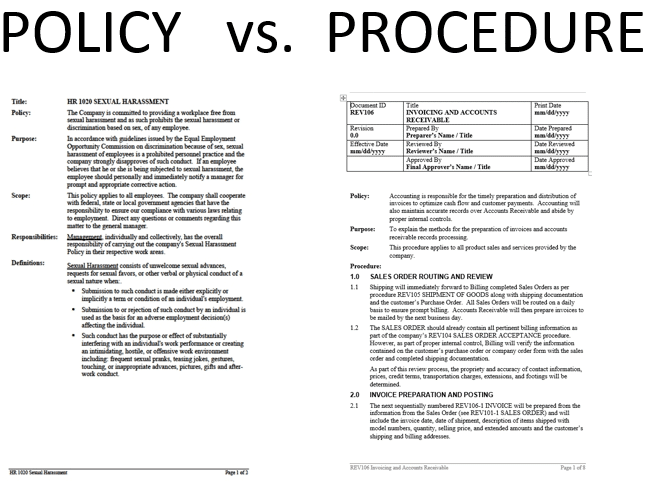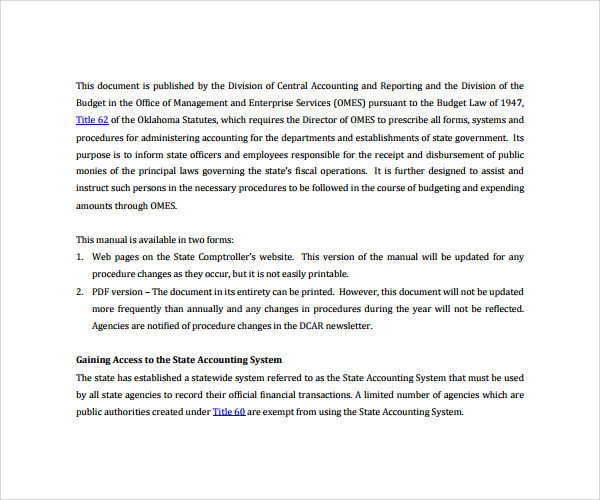Why create an on-line policies and procedures system? 2 Why separate policy and procedure? 3 Who are the primary users of the InfoSlug policies and procedures system? 3 What are the characteristics of good policies and procedure documents? 4 Good policies 4 Good procedures 5 Writing style for policy and procedure documents 5. Grab this free sample business accounting policy manual for your small business. This 22 page business policy manual for accounting is a sample of accounting policy and procedures that your small business can download and print to use as a guide to create your own business financial manual. SAMPLE FINANCIAL PROCEDURES MANUAL Approved by (organization’s) Board of Directors on (date) I. The Board of Directors formulates financial policies, delegates administration of the financial policies to the Executive Director and reviews operations and activities.
Accounting Tutorials
- Accounting Basics
Related Courses
Accounting Policies – From the name itself, it is clear that these policies are set of rules that dictate a company’s financial accounting.
In this article, we will go at length about what accounting policies are and the usefulness of these policies.
Accounting Policies And Procedures Examp…
Without much ado, let’s get started with the meaning of policies.

What are Accounting Policies?
Accounting policies are a set of rules or procedures by following which a company prepares its financial statements.
But you may ask why should a company need accounting policy?
When a company prepares a complex statement or calculate an advanced method of accounting, it needs guidelines to adhere to. For examples of accounting policies, to choose depreciation method, a company needs to follow specific accounting policy.
Accounting policy may vary company to company; but whatever a company does in regards to accounting policy, it should be in accordance with the generally accepted accounting principles (GAAP) or International Financial Reporting Standards (IFRS).
4.9 (1,067 ratings)
These policies are structures or frameworks for companies to follow. As the top management sets the benchmarks for maintaining the quality of the products or services in a company, accounting policy is also set as benchmarks to represent a sound and accurate picture of accounting practices within a company.
Recommended Courses
Significance of accounting policies
To understand the nitty-gritty of accounting policy, first, we need to understand the significance of accounting policies.
Accounting policies are significant for the following reasons –
- Proper framework: To articulate the financial affairs of the company, it needs to prepare financial statements. And if the financial statements are just prepared without any guidance, there would be no coherence within them. They help find out the coherence between financial statements. Accounting policy also offer a solid framework to follow so that the company may adhere to the right structure and prepare its financial statements.
- Disclosure: It’s important that a company discloses what accounting policy they have been following. Since accounting standards let any item be represented in many ways, a proper disclosure of the accounting policy is important.
- Providing advantage to investors: If the companies mention the accounting policy they used to produce the financial statements, it will also help the investors. By stating the accounting policy the companies ensure that they have maintained coherence while producing the financial statements. This coherence helps the investors look at the financial statements and compare with other companies from similar and different industries.
- The government can keep a hold on the company’s financial statements: Since all the financial statements should be prepared as per the accounting policy, the companies always follow a proper structure. These companies also need to keep in mind that they can only follow the accounting policy that is made as per GAAP or IFRS. Thus, the government can have a direct hold on the company’s financial statements and government can protect the interest of the investors.
Accounting Policies Examples
All financial statements are prepared by following specific policies. Here are a couple of practical examples of accounting policies which will help us understand how the accounting policy is followed –
Accounting Policies Example #1 – Revenue Recognition
Companies follow generally accepted accounting principles to recognize revenues. Recognizing revenue for the company is important because it positively or negatively impacts the investors. For examples of accounting policies, if a company recognizes its revenue when it doesn’t make any sale; it’s not the right approach. As per the revenue recognition, a company can’t recognize its revenue until it is earned. That doesn’t mean all revenue would be in cash. In the case of credit sales, the earning is also real.
For examples of accounting policies, Company T makes credit sales and recognizes it as revenue, two things are important. First, how first Company T can collect the cash for the credit sales it has made. And secondly, when the revenue is recognized – at the time of making the credit sales or at the time of receiving cash. If a company recognizes revenue at the time of recording credit sales and if the company doesn’t receive any cash by that point, the company would be called rich in revenue, but poor in cash. Accounting policy greatly affects how revenue is being recognized in a company.
As we see from the example below, Ford recognizes its Automotive segment revenue when all the risks and rewards of ownership are transferred to customers (dealers and distributors).
source: Ford SEC Filings
Accounting Policies Example #1 – R&D Expenses
R&D Expenses – which are capitalized and which are called expenses? This is a significant consideration in financial accounting and a company needs to follow the accounting policy to recognize the expenses or the capitalization. But how it is done? R&D expenses certainly have future benefits. That’s why R&D expenses have been treated as assets rather than expenses. But when a company is expensing R&D, it doesn’t know any specific future benefits. That’s why it can’t be capitalized in most cases. Sometimes when R&D expenses have specific future benefits, it can be capitalized. As per GAAP, one should recognize R&D expenses when they’re incurred.
We note from below Apples total R&D expense was $11.6 billion and $10.0 billion in 2017 and 2016, respectively.
source: Apple SEC Filings
Also, have a look at Capitalization vs Expensing
Accounting Policies – Conservative vs Aggressive
Writing Accounting Policies And Procedures
Typically firms operate within the periphery of two extremes in regards to accounting policy.
Either a firm follows an aggressive approach or a conservative approach.
No matter what approach a company follows, it needs to reflect the same in its accounting and in the way the accounting policies are followed in preparing the financial statements.
The same will also affect the profits. Visual studio 2013 tools download. An aggressive approach may end up generating more/less book profits. And a conservative approach may do the same. The company should stick to one specific approach so that the coherence is maintained.
If the company changes its approach from aggressive to conservative or from conservative to aggressive, it should be mentioned and also why it has been changing its approach for the protection of the interests of the investors.
According to International Accounting Standards 8, accounting policies are conventions, rules, procedures, principles, bases, and even practices. That means the whole framework of accounting standards in preparing and presenting the financial statements of the company can be called as accounting policies.
Accounting approach to using the accounting policy shouldn’t be based on a single transaction or event or condition. The accounting policy should be used by keeping the big picture in mind and by thinking about the preparation of financial statements and also how these financial statements would be represented to the investors.
Accounting Policies Video
Recommended Readings
This has been a helpful guide to Accounting Policies along with Accounting policies examples and its significance. You may also like our suggested articles below –